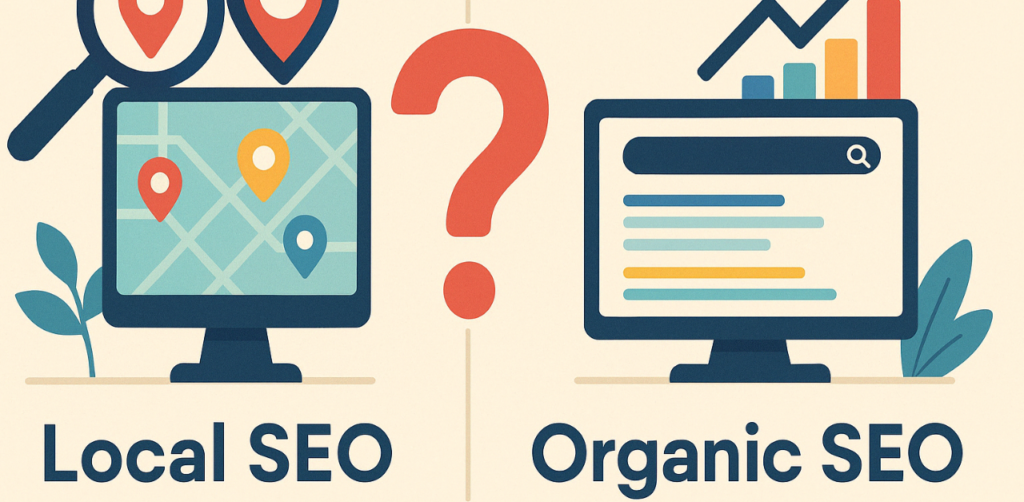If you’re in the real estate business, visibility online isn’t just helpful—it’s essential. According to the National Association of Realtors, 97% of home buyers begin their home search online. On top of that, Google data shows searches for “homes for sale near me” have grown by over 200% in the last two years. These numbers tell a clear story: real estate agents, brokers, and agencies need to be where buyers are looking—on the first page of search engine results.
Search engine optimization (SEO) is one of the most effective ways to ensure your real estate website shows up when potential clients search for homes, neighborhoods, or realtors. This guide explains how real estate SEO works and what you can do to improve your search rankings, attract website visitors, and convert them into clients.
What is Real Estate SEO and Why Is It Important?
Real Estate SEO involves optimizing your real estate website and its content to appear higher in search engine results when people search for homes, real estate agents, or market information online.
Why it matters:
- Most buyers search online. Being visible in search results puts you directly in front of active buyers and sellers.
- Free traffic. SEO brings organic traffic, unlike paid ads.
- Trust factor. People trust websites that appear on the first page of Google.
For example, when someone searches “condos for sale in Scottsdale,” Google displays a mix of real estate sites, Google Business Profiles, and map listings. If your website is optimized correctly, it has a much higher chance of appearing in those results—resulting in more clicks, calls, and conversions.
How Do I Research Keywords for My Real Estate Website?
Keyword research is the foundation of a good real estate SEO strategy. It helps you find the search terms your potential clients are typing into Google. Steps to find the right keywords:
- Start with Google Search suggestions. Type phrases like “homes for sale” and look at autocomplete suggestions.
- Use keyword tools like:
- Google Keyword Planner
- Ubersuggest
- Ahrefs
- SEMrush
- Focus on long tail keywords such as:
- “3-bedroom homes in Dallas under 400k”
- “best neighborhoods in Austin for families”
- Check keyword difficulty and search volume.
- Aim for phrases with decent search volume but not too competitive.
- Analyze competitors. Look at what top-ranking real estate sites are targeting.
Targeting specific, location-based search terms helps you appear in local search results where it matters most.
What Are the Best Practices for On-Page Optimization in Real Estate SEO?
On-page optimization refers to changes made on your web pages to improve search engine rankings. Key best practices:
- Title tags and meta descriptions: Include relevant keywords and keep them under recommended character limits.
- Headings: Use H1 for the page title and H2s for section headers.
- Content: Write detailed property descriptions and include relevant content for each city or neighborhood.
- URLs: Use clean, readable URLs (e.g., /homes-for-sale-chicago).
- Internal linking: Link to related pages like blog posts or neighborhood guides.
- Images: Add relevant images and use descriptive alt text for SEO and accessibility.
- Mobile responsiveness: Ensure your site works well on all mobile devices.
For example, instead of listing a home as “Nice house, 3 beds,” describe it fully as a “Spacious 3-bedroom home in North Phoenix with mountain views and updated kitchen—perfect for families.”
How Do I Build Quality Backlinks for My Real Estate Website?

Backlinks—links from other websites to yours—tell search engines that your site is trustworthy. Here’s how to earn high-quality backlinks:
- Local directories: Add your site to Google Business Profile, Yelp, Realtor.com, and other business directory listings.
- Guest blogging: Write articles for local or real estate blogs.
- Partner with local businesses: Ask for backlinks from mortgage brokers, staging companies, or inspectors.
- Shareable content: Create infographics or local market guides others will want to link to.
- Press releases: Share newsworthy updates like opening a new office or hosting community events.
Avoid buying backlinks or using spammy tactics. These can lead to penalties and harm your search rankings.
What Tools Can I Use to Measure the Success of My Real Estate SEO Efforts?
Tracking your SEO performance helps you see what’s working and where you can improve. Some of the recommended SEO tools include:
- Google Analytics: Track website visitors, traffic sources, and conversions.
- Google Search Console: Monitor search performance and fix indexing issues.
- Ahrefs or SEMrush: Analyze keyword rankings, backlinks, and competitor data.
- Moz Local: Track and manage your local SEO listings.
- RankMath or Yoast (for WordPress): Optimize on-page SEO elements.
These tools help you monitor traffic, keyword rankings, bounce rate, and which pages are bringing in the most leads.
How Can I Optimize My Real Estate Listings for Search Engines?
Property listings are your main content. Each listing should be fully optimized to bring in organic traffic. Here are tips to optimize listings:
- Unique titles: Avoid duplicate titles like “3 Bed Home.” Use “3-Bedroom Home for Sale in Buckhead with Pool.”
- Detailed descriptions: Include details like square footage, neighborhood, schools, and amenities.
- Use target keywords naturally throughout the text.
- Add local terms: Include city and neighborhood names.
- Include images and video tours with keyword-rich file names and alt tags.
- Schema markup: Use real estate schema to help search engines understand your listing data.
The goal is to turn each listing into a valuable piece of content that can rank on Google.
What Is the Role of Social Media in Real Estate SEO?

Social media does not directly boost search rankings, but it helps your content reach more people, which can lead to more backlinks and traffic. To use social media for SEO support:
- Share listings and blog posts regularly on platforms like Facebook, Instagram, and LinkedIn.
- Use location tags and relevant hashtags.
- Encourage sharing. The more your content is shared, the more visibility it gets.
- Engage with followers. Respond to comments and messages to build trust.
Social signals and increased visibility can lead to more brand searches, which improve your site’s relevance in search engine algorithms.
How Often Should I Update My Real Estate Website for SEO Purposes?
Search engines prefer fresh, updated content. Here’s how often you should update them based on the content type:
- For property listings, update when homes are sold or go off-market.
- For blog posts, post local market updates, buying tips, or neighborhood spotlights 2–4 times per month.
- For pages, refresh community pages or add new service areas quarterly.
- For technical SEO checks, review site speed, broken links, and errors monthly.
Keeping your content current helps you rank higher and shows potential clients that you’re active in the real estate market.
How Can a Digital Marketing Agency Help You with SEO for Real Estate?
A digital marketing agency brings strategy, tools, and consistent SEO practices so you don’t have to manage everything alone. At Web Search Marketing, our team knows the real estate industry and how to position your business online. Here’s how we help:
- Complete keyword research based on your target audience and area.
- On-page optimization, including title tags, descriptions, and structured data.
- Content strategy with blogs, guides, and local pages that rank.
- Backlink outreach from trusted real estate sites and local partners.
- Monthly reporting using tools like Google Analytics and Search Console.
- Google Business Profile optimization for better local search results.
We understand how the home buying process works and use that insight to drive real results. Our SEO services are tailored to your real estate goals, whether you’re a single agent or a large brokerage.
Make Your Real Estate Website Work for You
Real estate SEO is not a one-time task. It’s a long-term strategy that helps you stay visible where it counts—on Google and other search engines. From keyword research to backlink building and content updates, every piece plays a role in bringing the right clients to your website.
At Web Search Marketing, we build SEO strategies that work for the real estate industry. Our team understands how to rank real estate listings, optimize your site for mobile users, and improve your online visibility. Book a consultation today and start getting more leads from organic search.
































